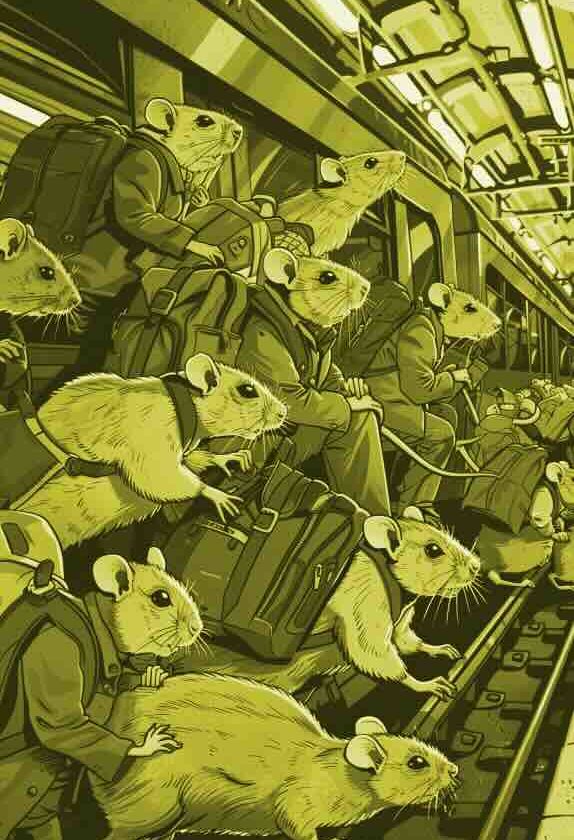Climate change is a perverse phenomenon in that the consequences of our current actions have no immediate effect. It is rather a kind of powder keg that we fill every day and that can explode at any moment. We are all more or less informed on the subject. However, those who do not seem to be interested in it are often those who will be the least affected in the end.
This illusion or postponement of serious consequences removes the burden of urgency from us. The oldest among us will not have to suffer from the deleterious effects of climate change because they will no longer be around when its repercussions are most vivid. Moreover, there is a sad irony that adds to it: the decision-makers of the lives shortened by climate change will not suffer in time or space the consequences of their decisions. With the exception of Australia, all of the developed countries will be relatively unaffected by climate change, at least in comparison to those in the developing world.
It is as if we were on a ship adrift with a captain who is terminally ill. The fate of the passengers does not matter to him, he leads his ship as he sees fit and has no particular anxiety at the idea of sinking, his fate is already sealed.
However, there are several strategies available to us to resolve this unequal balance of power. Let’s look at some principles from Sun Tzu’s art of war to thwart the traps that are set for us.
Principle 1. War is a serious matter, one should not engage lightly. One must be ready at all times, but attack only if there is a good reason and when it is the right time.
Here, we must remember the consequences of climate change on our way of life and that of our children. It is a question of survival, so it is of the utmost importance. In this sense, we must know how to identify those who serve its cause (who contribute to it by their irresponsible decisions at the top of the economic and political hierarchy) and those who work towards its resolution. Knowing what is at stake, one should not engage in it lightly, as it can be a matter of a lifetime. Here the idea of attack is rather vague. Attack what? Attack who? In my opinion, we should rather treat the causes of climate change by fighting by all means its artisans. In this respect, we are all guilty in some ways, by our consumption, we contribute to feed the machine that disturbs the ecosystems. If there is a first thing to fight, it is ourselves and the bad habits we have taken.
Principle 2. Evaluate the balance of power and be discerning. Leave no stone unturned. Logistics, terrain and timing are important.
It is difficult to beat an enemy at his own game. Since many decisions with serious consequences are made by more scrupulous leaders, attention must be directed to those who are working for climate chaos. The strategy of cancel culture that already exists to condemn discriminatory speech should be used just as much against those who are disrupting the climate through their political and economic choices. Having the ability to damage someone’s image on the basis of reliable sources is as good a method as any to dissuade them (and others in power) from making decisions with serious consequences.
Principle 3. The art of war is to win without fighting. The essence of war is manipulation. To be unpredictable, not to reveal one’s plans, but to know and control the plans of one’s opponents. To rely on a fixed rule is defeat.
It can be said that most political and economic leaders have succeeded in applying this principle to perfection in the sense that we are obsessed with secondary or even unimportant matters. The distractions to which we give in have made the mass of people resigned or at least without a clear direction for the future. On a large scale, it is difficult to work in secret so that our adversaries surrender without a fight. Their interests are great to make the machine work. They have no interest in letting things drag on if they should turn out to be unfavorable for them.
Principle 4. Attack the opponent’s plans, if not his alliances, and finally engage in physical combat. The ultimate strategist knows his opponent and knows himself.
To defeat the roadmaps that are there to build us a future of natural disaster and massive population displacement, one should be able to attack them at the root. In order for them to unfold, they need the support and moral authority of those who implement them. If their actions are discredited, they can lose their footing and may concede ground or at least slow down the progress of their actions.
Principle 5. Time is the friend of one and the enemy of the other. If time is on our side, patience, the art of stalemate, becomes a formidable tactic, which exhausts the opponent. On the other hand, if time is against us, we need to create the conditions to win quickly.
Clearly, in the case of climate change, time plays an unfavorable role. The more we remain passive and spectators, the more serious consequences are to be expected for the future. Those who work to destroy ecosystems are on the contrary favored by time. The wait-and-see attitude plays in their favor since they hold the power and still act as they please today.
We need a rapid change in this dynamic: a shift to actions that reverse this relationship to time. Regaining the advantage means setting our own pace, our own schedule.
Principle 6. What depends on us is to build an invincible defense. Success in the offense consists in seizing the opponent’s weaknesses. To win is to win before fighting; to lose is to fight before winning.
To win before fighting, one must have a clear idea of the possible outcomes available to us. In the case of climate change, the adversary is a bit everyone, so it is nobody in the end. This dilution of responsibility is conducive to stagnation. Since the actors of climate change are not clearly identified, it is difficult to defeat them. To win before fighting, one must first secure one’s positions. This is a rather difficult rule to apply in this case, but it may be food for thought.










